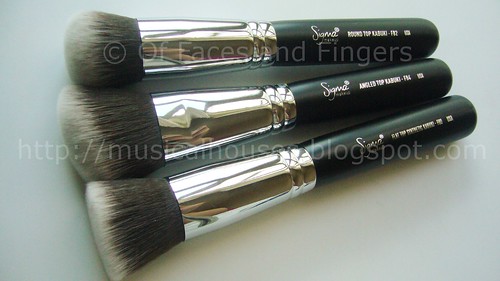Happy New Year everyone! I hope you have had great fun counting down to 2011! I thought I'd start the new year trying out a brand I've never reviewed before - Sigma Beauty. They have been out there in the blogosphere for awhile due to their brushes, and while there have been some differences in opinion, in general it seems that Sigma's brushes garner glowing reviews, complete with dupes for MAC brushes. I was pretty skeptical of the reviews (really, you expect me to believe that EVERY self-proclaimed Youtube "guru" loves these brushes?), and it appeared that there was only one way for me to discover whether these were really worth the hype or not. And that's how I ended up with a few Sigma brushes.
It can be pretty daunting picking from Sigma's wide array of makeup brushes. Sigma only does brushes and accessories, so you can imagine how specialized they are. They have a gazillion face brushes, so out of those I zoomed in on three that looked interesting. These are three kabuki brushes, in various shapes that intrigued me. While most brands only have one single kabuki brush, Sigma has three! How's that for variety?
The three kabuki brushes shown here are the Round Top Kabuki F82, the Angled Top Kabuki, F84, and the Flat Top Synthetic Kabuki, F80. They are arranged in that order from top to bottom in this photo:
Although only the Flat Top Synthetic Kabuki F80 lists itself as being synthetic, all three brushes are synthetic, and made of the same type of brush bristle. The bristles are actuay quite soft and well-formed, and remind me of the same synthetic bristles used by Too Faced and The Body Shop, two other brands with popular brands of synthetic brushes. The bristles are also very well-packed, as one might expect of a good quality kabuki brush - definitely no floppy bristles here! These brushes were definitely made to buff. Another thing I like about the bristles is that because they are synthetic, these brushes are good for applying not solely powder, but also cream, liquid, and gel products. Natural hair brushes tend to "soak up" liquid products, so for any liquid-based product, synthetic brushes tend to be more ideal.
The handles and ferrules of the brushes are also pretty sturdy - definitely no hair falling off, or no glue coming un-sticky. They were actually of much better quality than I expected them to be. The handles are all the same length, and are pretty uniform.
So now you must be wondering - if they're all kabukis, what's the difference between them? Well, first of all, there is shape. The Round Top Kabuki, Flat top Kabuki, and Angled Top Kabuki all have different shapes. Pretty obvious, right? But there is also bristle length. The Round Top Kabuki F82 is the brush with the shortest bristles, while the Angled Top Kabuki F84 has the longest bristles. Also, although all the brushes have tightly-packed bristles, there is still slight variance in the density of the bristles. The Round Top Kabuki has the densest bristles, while the Angled Top has the sparsest bristles.

So what does this mean, if you're looking at all these kabukis? Well, denser bristles tend to translate into a heavier appication of product. So if you're looking to apply product with these, pick a denser-bristled brush if you want a heavier application, and vice versa. That said, since all three brushes are kabukis, application is granted to be a pretty heavy, so the variance isn't too large. If you're not looking to apply product, but just to buff out the product on your skin after application, then denser bristles tend to buff out products better, so once again, if this brush is purely for buffing, it would be better to pick a denser brush. However, once again, I'd caveat that since all these brushes are kabukis, they're all going to be dense - it's just how dense they are.
Lastly, there is shape. Brush shapes can be a little bit subjective to some extent, since someone's ideal bronzer brush can be another person's contouring brush. But personally, I'd use the Flat Top Synthetic Kabuki F80 for buffing in all-over face products, like foundation and powder, while I'd use the Angled Top Kabuki F84 for cheek products (blush, bronzer, contouring powder even), since it's handy angled shape would come in really useful for such functions. The Round Top Kabuki Brush F82, would be useful for any tight spots that require lots of buffing, since this brush is a very effective buffer.
Over the next couple of posts, I'll be comparing these brushes to the ones I currently already have in my stash, and doing comparisons for each of them in a bit more detail. But for now, if you need a good synthetic kabuki, these are actually worth looking into.







